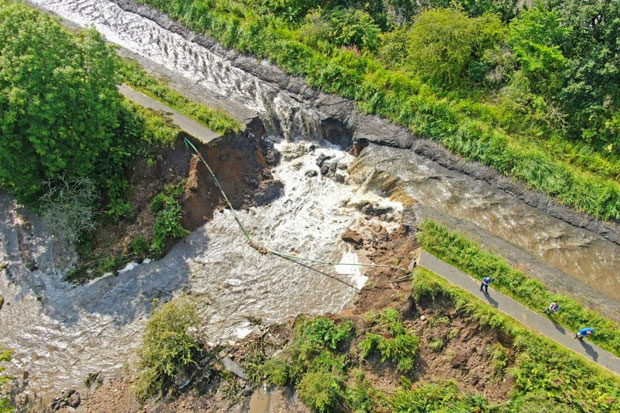The breach at Muiravonside near Polmont was the result of a one in 240-year storm which saw a huge volume of water flow into the Union Canal from upstream before washing over the embankment and down the towpath to the fields and railway track below. The incident left the 200-year-old waterway unnavigable and the adjacent towpath closed to walkers and cyclists. Scottish Canals and our contractor were onsite within the hour, leading an emergency response to stop the flow of water and rescue over 11,000 displaced fish.
The event was recorded by Historic Environment Scotland for its historic significance, highlighting the danger and far reaching effects of climate change. Following comprehensive embankment strengthening works in winter 2021, the canal was re-watered in April 2021, with the waterway and towpath reopening to walkers, cyclists, and boaters ahead of the summer season.
The embankment reinstatement and strengthening works were made possible with funding from the Scottish Government, along with wider resilience measures in other key locations to reduce the risk of similar breaches elsewhere along the Lowland Canals and to combat the effects of climate change. Scottish Canals has marked the first anniversary of the incident with the release of a video which recognises how Scotland's canals help tackle climate change.
Scottish Canals' Chief Operating Officer, Richard Millar, said: "As we recognise the last year and the work that has gone into reinstating the Union Canal at the breach site near Muiravonside, we need to pause and think about the ongoing effects of climate change on our heritage structures as well as how they can be part of the solution.
"The breach that took place a year ago serves as a reminder of the vulnerability of our historic assets. Historic and future land use combined with an increasingly changing climate suggests that we face more intense periods of rainfall in the future and this presents a significant threat to the integrity the canal infrastructure.
"Scottish Canals and partners have improved our understanding from what happened at Muiravonside and carried out a number of climate change resilience works that were informed by our Asset Management Strategy which will future proof the canal for generations to come."
Muiravonside one year on from Scottish Canals on Vimeo.
Scotland's canals are recognised for offering low-carbon, traffic-free sustainable travel routes but there are numerous ways which these inland waterways can contribute to the battle against climate change.
Embankment works on The Union Canal included upgrading overflowing weirs, culverts under the canal, emergency stop plank installations and monitoring equipment which will assist in remote sensing and notification of significant events.
At the beginning of August, Scottish Canals announced plans to achieve net zero by 2030 with a programme of climate works at the world's only rotating boat lift – The Falkirk Wheel – that will see £250,000 of green investment deliver 85 new solar panels and a new air source hear pumps to assist the gradual phasing out of gas fired boilers at the popular tourist destination.
The launch of the #CanalsDoNetZero marketing campaign will celebrate the range of climate adaptation and mitigation innovations currently being planned in the year of COP26 and beyond.









![Ramsay & Sons [Forfar] Ltd](http://www.construction.co.uk/advnew/495084bul.jpg)








